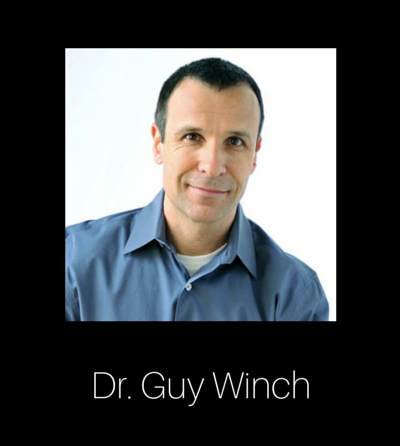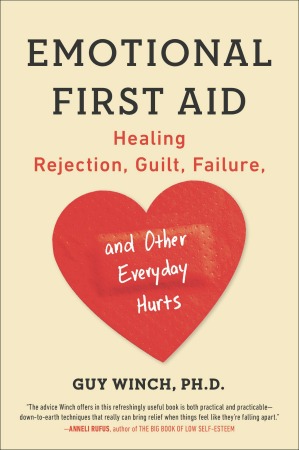Interview with Dr. Guy Winch
A member of the American Psychological Association and an expert in the causes and reduction of emotional distress, Dr. Guy Winch is a much sought after keynote speaker and internationally renowned author.
Dr. Winch received his doctorate in clinical psychology from New York University in 1991 and completed a postdoctoral fellowship in family and couples therapy at NYU Medical Center. He has been working with individuals, couples and families in his private practice in Manhattan, since 1992.
Q & A
As a licensed psychologist in private practice whose ideas within the field of psychotherapy have influenced you the most?
I have not been influenced by any one thinker in the field. Rather, I have always found it useful to read research articles, get a broad sense of new developments and findings, and then try to integrate them into my work as a writer and practitioner.
What is emotional hygiene?
Emotional hygiene involves caring for and maintaining your psychological health by treating emotional wounds such as failure or rejection when you sustain them and adopting habits that increase your emotional resilience.
Could you tell us about your latest book 'Emotional First Aid'?
Emotional First Aid is a tool kit for common emotional injuries - it provides scientific information on what happens to us when we experience wounds like loneliness, guilt, loss, or failure and lays out concrete, easy to apply treatments that will soothe your emotional pain, help you heal, and help you increase your emotional resilience. See following link for full details.
What would you suggest is the main reason we don't take our emotional health as seriously as our physical health?
We simply haven’t developed the awareness about how important psychological health is to our quality of life. People usually have bandages, ice packs, and cold or cough medication lying around the house, but nothing for psychological wounds - they don’t even know injuries like rejection and failure can be treated, let alone what those treatments are.
Remarkably (and unfortunately), most people’s understanding of their mind and how it operates is not much different than it was 100 years ago.
In your TED talk, you state that one of the most common and damaging psychological habits is rumination. Could you explain what you mean by rumination and suggest a strategy for stopping this habit in its tracks?
Rumination refers to replaying upsetting events in your mind over and over again - however, doing so without problem solving or trying to get a new perspective - just stewing in the bad feelings. This habit is very common and is linked to depression, alcoholism, poor problem solving, passivity, cardiovascular disease and a host of other problems.
To break the habit you have to use a 2 minute distraction every time the distressing thought comes to mind - any distraction that requires concentration will do. In time, the urge to ruminate about the event will subside.
You've argued that generally speaking, generic positive affirmations aren't useful. Why do you believe this is the case?
Studies have shown that positive affirmations such as "I’m going to be very successful" or "I’m worthy of great love" tend to make people with low self-esteem feel worse about themselves, not better. This happens because the affirmations fall too far outside their current belief systems so their unconscious minds reject them.
To what extent does the use of social media make us more susceptible to psychological injury?
Social media presents a whole new arena of social interactions but one in which you interface with multitudes of people at once. Therefore, when you post a status update on FB and none of your 521 friends 'likes' it, you can end up feeling rejected 521 times. You see your friends go on great vacations and have great lives but if you’re feeling lonely, those pictures will make you feel even worse.
Your significant other breaks up with you and updates their status on FB and now everyone knows, whether you want them too or not, whether you’re ready for it or not. So there is a lot of opportunity for heartache and psychological injury.
What advice would you give to someone hoping to pursue a career in clinical psychology?
It’s very important to understand that what you learn in school, college, university is only the foundation upon which you need to build. Keep learning, keep reading, keep trying new approaches and new ways of thinking - and don’t get lost in a single approach.
When it comes to psychotherapy - one size does not fit all So have a variety of tools at your disposal when you start working with clients/patients and then you can choose the right tool for the right person/situation.
Connect With Dr. Guy Winch
Recent Articles
-
Tourettes: Understanding Tourette Syndrome Beyond Stereotypes
Feb 23, 26 06:01 AM
Learn what tourettes really is, why swearing is a myth for most, and how education reduces stigma around Tourette syndrome. -
Psychological Impact of Catastrophic Injury & Recovery
Feb 17, 26 02:26 AM
Explore the psychological impact of catastrophic injury, including trauma, identity shifts, resilience, and long-term mental health recovery. -
Psychology Articles by David Webb
Feb 10, 26 06:31 AM
Discover psychology articles by David Webb, featuring science-based insights into why we think, feel, and behave the way we do.
New! Comments
Have your say about what you just read! Leave me a comment in the box below.Go To The Psychology Expert Interviews Page







New! Comments
Have your say about what you just read! Leave me a comment in the box below.